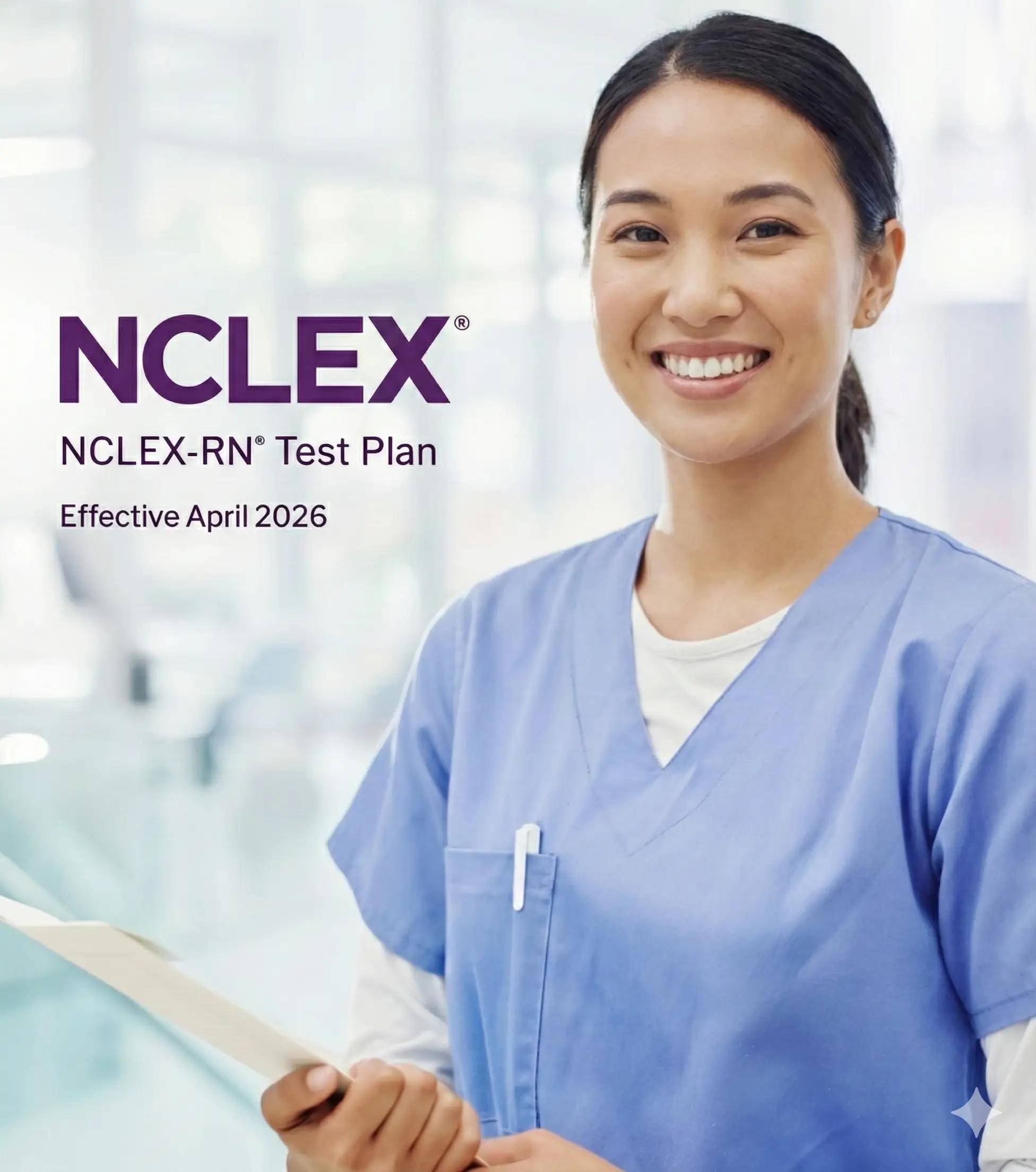Studying for the NCLEX can feel intimidating, especially with the new Next Generation (NGN) question formats. The exam is adaptive, unpredictable, and designed to test not just what you know, but how well you can think like a nurse in real clinical situations.
The good news is that once you understand what the NCLEX contains, you can get the most of your study time by focusing on high-yield topics. This guide breaks down what’s on the exam, where to focus your time, and how to build a study routine that actually leads to progress.
NCLEX Content Breakdown
The NCLEX is designed to test your ability to perform clinical decision-making and safety-focused prioritization. Questions will come in the form of cases and you’ll have to decide what to do in order to pass.
How Scoring Works
The NCLEX uses Computerized Adaptive Testing (CAT), which adjusts the difficulty based on your answers. You pass when the algorithm determines you’re consistently making safe, correct decisions above the passing standard. That means:
You don’t need to get every question right. You just need to think safely and consistently.
Understanding Next Gen (NGN) Question Types
The newer NCLEX question formats are designed to simulate real nursing judgment. Expect formats like:
- Case Studies
- Matrix (Select Multiple Responses in a Table)
- Drag-and-Drop Clinical Judgment Steps
- Highlight-and-Select Questions
These questions may look harder — but NGN offers partial credit, so even if you don’t get everything perfect, correct reasoning is rewarded. That’s why we recommend that you focus on how to interpret data and respond appropriately by learning how to tackle cases properly. We’ve prepared a step-by-step guide to reading NCLEX cases that you can watch.
High-Yield Topics to Master First
To make your study time effective, focus on topics that appear frequently across multiple question types:
- Infection Control & Isolation Precautions (PPE order, transmission categories)
- Priority Setting (ABCs, Maslow’s, Acute vs. Chronic)
- Medication Safety (common side effects, contraindications, antidotes)
- Electrolytes & Critical Lab Values (K⁺, Na⁺, Ca²⁺ shifts and symptoms)
- Delegation Rules (RN vs. LPN vs. UAP responsibilities)
- OB & Peds Emergencies (preeclampsia, newborn distress, milestones)
- Psych Crisis Interventions (suicide precautions, therapeutic responses)
If your study sessions feel too broad or scattered, start by mastering these high-impact areas before moving to niche topics.
Proven Study Strategies That Work for the NCLEX
Instead of passively rereading notes or watching endless videos, use active learning techniques that actually build retention and clinical judgment.
1. Use Questions Before Content ("Question-First Learning")
Rather than reviewing a full chapter before practicing, start with 10–15 questions on the topic first. This reveals:
- What you already know
- What you thought you knew but don’t
- What the NCLEX actually asks about
Then study the topic with those gaps in mind.
2. Review Rationales the Right Way
Don’t just look at why the correct answer is correct. For every question, ask:
- Why is the right answer correct?
- Why are the wrong answers wrong?
- Why did I choose what I chose? (Was it guessing? Misreading? Lack of knowledge?)
This reflection builds pattern recognition — which is exactly what the NCLEX is scoring.
3. Teach It Out Loud
If you can teach a topic clearly — even to yourself — you understand it. Close your notes and explain:
“If a patient has hypokalemia, I would expect ____, I would assess ____, and I would treat with ____.”
If you struggle to explain it, that’s your cue to review.
4. Study by Clinical Scenario — Not Just Topic
Instead of studying “Diabetes” as isolated facts, ask yourself:
“If a diabetic patient’s blood sugar is 52 mg/dL, what’s my first action?”
Framing content as real decisions prepares you for NGN-style thinking.
A Done-For-You Optimized NCLEX Study Schedule
If you don’t want to plan all of this manually, NCLEX Bootcamp provides:
- A personalized day-by-day NCLEX study plan based on your test date
- Next Gen-style question banks with case studies and partial-credit scoring
- Strategy videos that walk you through how to answer NGN questions step-by-step
- A downloadable 12-Week Study Schedule to help you stay on track.
Thousands of first-time test takers use it to structure their preparation without guessing what to study next. Start studying for the NCLEX for free with Bootcamp today.
Get everything you need in one place. Start studying today for free.



















